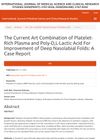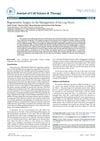 3 citations,
September 2022 in “Cureus”
3 citations,
September 2022 in “Cureus” Platelet-rich plasma shows promise for treating various female reproductive health issues but requires more research.
[object Object]  3 citations,
November 2021 in “Clinical, Cosmetic and Investigational Dermatology”
3 citations,
November 2021 in “Clinical, Cosmetic and Investigational Dermatology” Platelet-Rich Plasma may improve skin health and reduce wrinkles, but more research is needed for standard treatment guidelines.
 2 citations,
January 2022 in “Genetics Research”
2 citations,
January 2022 in “Genetics Research” Using hemocoagulase with platelet-rich plasma in hip replacement can lessen blood loss and improve healing and blood clotting.
 2 citations,
December 2021 in “Journal of Cosmetic Dermatology”
2 citations,
December 2021 in “Journal of Cosmetic Dermatology” Platelet-rich plasma may help with hair loss by promoting hair growth.
 1 citations,
August 2023 in “International Journal of Molecular Sciences”
1 citations,
August 2023 in “International Journal of Molecular Sciences” Platelet Rich Plasma-Derived Extracellular Vesicles show promise for healing and regeneration but need standardized methods for consistent results.
 1 citations,
March 2023 in “International Journal of Trichology”
1 citations,
March 2023 in “International Journal of Trichology” Platelet-rich plasma didn't increase hair length but may help keep hair follicles alive.
 November 2024 in “Journal of Cosmetic Dermatology”
November 2024 in “Journal of Cosmetic Dermatology” PRP improves hair transplant results in androgenetic alopecia patients.
August 2024 in “Journal of Clinical Medicine” PRP shows promise but lacks consistent evidence and regulation.
January 2023 in “Journal of Cosmetic Dermatology” PRP is effective for treating hair loss, improving hair density, count, and thickness.
November 2022 in “Frontiers in Medicine” PRP shows promise for treating mild alopecia areata but needs more research for cicatricial alopecias.
 18 citations,
March 2022 in “Drug design, development and therapy”
18 citations,
March 2022 in “Drug design, development and therapy” Platelet-rich plasma (PRP) may help with various hair loss types, but more research is needed to find the best use method.
 November 2024 in “Deleted Journal”
November 2024 in “Deleted Journal” Platelet-rich plasma injections can help treat hair loss in lupus patients.
 October 2022 in “International journal of medical science and clinical research studies”
October 2022 in “International journal of medical science and clinical research studies” Mixing platelet-rich plasma with Poly-D,L-Lactic Acid helps reduce deep lines around the nose and mouth.

Hair transplants are effective for male and female pattern baldness, have evolved in technique, and require careful planning for natural results and managing complications.
 15 citations,
January 2016 in “Journal of cell science & therapy”
15 citations,
January 2016 in “Journal of cell science & therapy” Using a patient's own tissue for micro-grafts may effectively treat non-healing leg ulcers and relieve pain.
 April 2024 in “Journal of cosmetic dermatology”
April 2024 in “Journal of cosmetic dermatology” Platelet-rich fibrin might be a promising treatment for hair loss, but more research is needed to confirm its effectiveness.
 29 citations,
December 2019 in “Transfusion and Apheresis Science”
29 citations,
December 2019 in “Transfusion and Apheresis Science” Platelet-derived bio-products help in wound healing and tissue regeneration but lack standardized methods, and their use in medicine is growing.
 14 citations,
April 2020 in “Journal of Cosmetic Dermatology”
14 citations,
April 2020 in “Journal of Cosmetic Dermatology” QR678 treatments were more effective and comfortable for male hair loss than PRP treatments.
 July 2023 in “IntechOpen eBooks”
July 2023 in “IntechOpen eBooks” New treatments for alopecia areata show promise, but more research is needed to confirm their effectiveness.

 25 citations,
July 2014 in “Hong Kong medical journal”
25 citations,
July 2014 in “Hong Kong medical journal” Some skin disorders might be linked to H. pylori infection, but more research is needed to confirm this.
 4 citations,
August 2020 in “Journal of Cosmetic Dermatology”
4 citations,
August 2020 in “Journal of Cosmetic Dermatology” QR 678 and QR678 Neo treatments are effective for hair loss in women with PCOS.
 November 2023 in “Frontiers in cell and developmental biology”
November 2023 in “Frontiers in cell and developmental biology” Hair aging is caused by stress, hormones, inflammation, and DNA damage affecting hair growth and color.

OCT can effectively screen and diagnose various medical conditions non-invasively.

Umbilical cord blood is a valuable source of stem cells for medical treatments, but its use is less common than other transplants, and there are ethical issues to consider.
 14 citations,
May 2019 in “Journal of Maxillofacial and Oral Surgery”
14 citations,
May 2019 in “Journal of Maxillofacial and Oral Surgery” FUE hair transplant is a promising method with benefits like less scarring, but requires a skilled surgeon and can damage hair follicles.
 October 2024 in “Journal of Cutaneous and Aesthetic Surgery”
October 2024 in “Journal of Cutaneous and Aesthetic Surgery” Including the parietal eminence in hair transplants improves scalp appearance and balance.
[object Object] 5 citations,
January 2019 in “Revista Latino-americana De Enfermagem” Making platelet-rich plasma gel is cheap, safe, and easy when done by trained professionals.
 1 citations,
January 2018 in “Journal of V. N. Karazin Kharkiv National University: Series Medicine”
1 citations,
January 2018 in “Journal of V. N. Karazin Kharkiv National University: Series Medicine” Platelet-rich plasma can positively affect common hair loss, but more research is needed for standard use.
 September 2017 in “Springer eBooks”
September 2017 in “Springer eBooks” PRP injection therapy shows promise for treating hair loss, increasing hair count and thickness with minimal side effects.


























